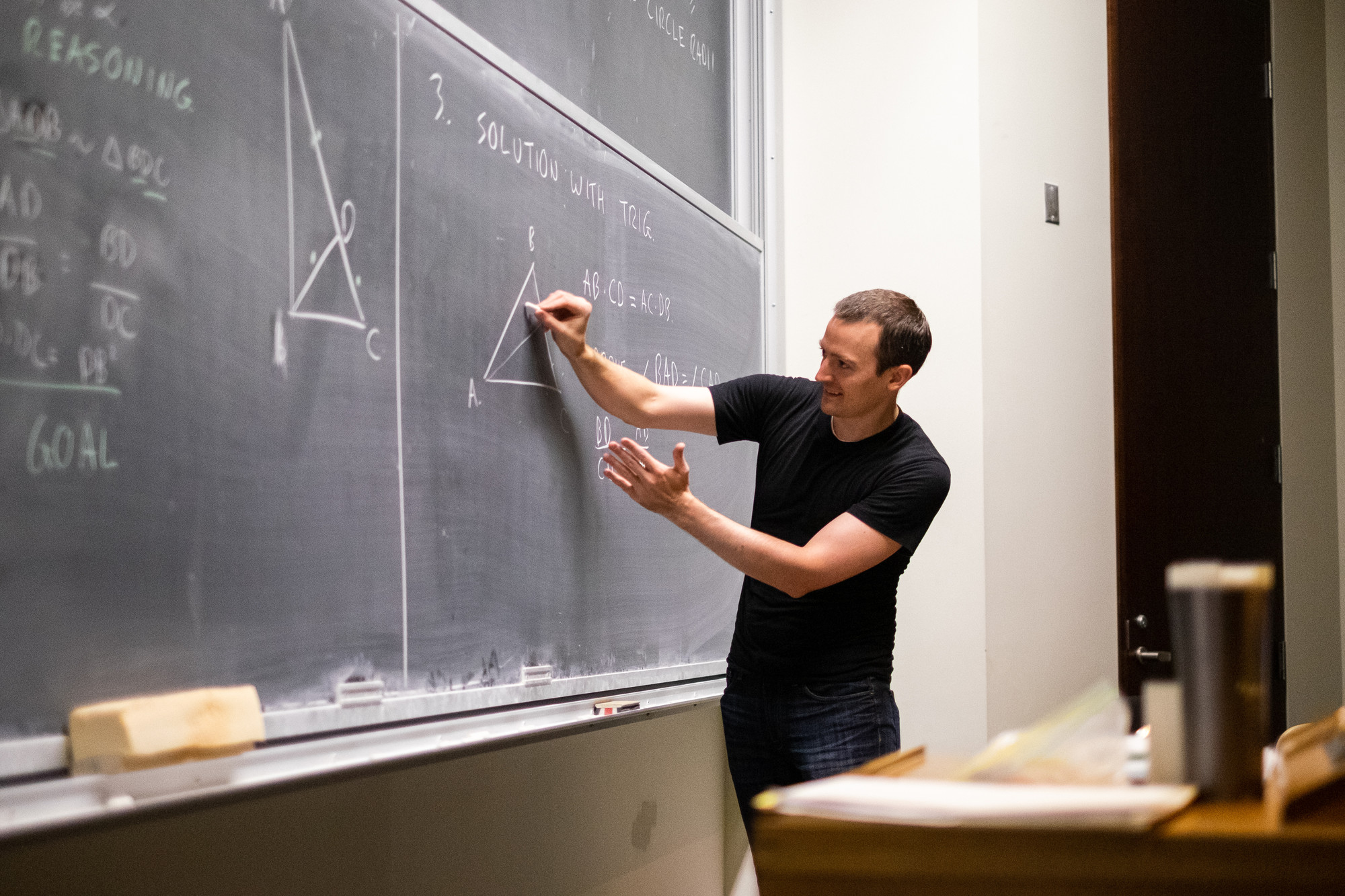Program Requirements — PhD
The PhD Program normally takes four years of full-time study beyond the Master's level to complete. A Master's degree is a prerequisite. Expected progress is outlined in the following table:
|
Year
|
Expected Progress |
|---|---|
| Year 1 | Course work (6 courses on your transcript); Pass atleast three comprehensive exams; Select a thesis advisor. |
| Year 2 | Supervisory committee selected by student and the thesis advisor; First annual supervisory committee progress report due. |
| Year 3 | Presenation of preliminary thesis result to supervisory committee; Achieve PhD candidacy |
| Year 4 | Thesis content seminar; Departmental PhD thesis examination; Final PhD thesis examination at the School of Graduate Studies. |
| Year 4 — October | Student interested in academic employment after the PhD must have a major thesis results ready. |
1) Coursework for PhD (4-year program):
Completion of at least 6 half-courses (or the equivalent combination of half and full-year courses). Normally, 6 half-courses are taken in the first year of study (3 half courses in the fall term and 3 in the spring term). It is strongly recommended that student take some additional courses in later years.
2) Comprehensive Examination:
The student is required to pass six core courses with an A- grade before beginning an area of specialization. A single "pass/fail" examination in the six general areas (analysis (real and complex), algebra, topology, partial differential equations, linear algebra & optimization and probability) is offered over a 2-day period in early or late September. Passing the comprehensive exam will fulfill the core course requirement. Students have the option to write the final exam of any core course and obtain core credit.
3) Thesis
The main requirement of the degree is an acceptable thesis. This will embody an individual contribution to original research of a stand that warrants publication in the research literature. It must be written under the supervision of one or more members of the department.
For more information on Thesis requirements, please see our 2025-26 Graduate Studies in Mathematics Handbook.
4) Departmental Academia / Student Advancement
Students are expected to become extensively involved in departmental life (seminars, colloquia, and related activities).
The following is a list and description of the core courses offered to graduate students during the academic year. These are the basic beginning graduate courses. They are designed to help the student broaden and strengthen his/ her general background in mathematics prior to specializing towards a thesis. A student with a strong background in the area of any of the core courses should not take that particular course:
|
Course Codes
|
Cross-listed codes
(Undergraduate)
|
Course Description
|
|---|---|---|
| MAT1000H F | MAT457H1 F | Real Analysis |
| MAT1001H S | MAT458H1 S | Real Analysis II |
| MAT1002H S | MAT454H1 S | Complex Analysis |
| MAT1060H F | Partial Differential Equations I | |
| MAT1061H S | Partial Differential Equations II | |
| MAT1100H F | Algebra I | |
| MAT1101H S | Algebra II | |
| MAT1300H F | Topology I | |
| MAT1301H S | Topology II | |
| MAT1600H F | Mathematical Probability I | |
| MAT1601H S | Mathematical Probability II | |
| MAT1850H F | Linear Algebra and Optimization |
Program Requirements — PhD Direct-Entry
The PhD Direct-Entry program normally takes five years of full-time study to complete. Expected progress in the program is outlined in the following table:
|
Year
|
Expected Progress |
|---|---|
| Year 1 | 6 courses of which four half-course credits in core material. Completion of a summer Supervised Research Project |
| Year 2 | Course work; Pass at leat 3 comprehensive exams; Select a thesis advisor. |
| Year 3 | Supervisory committee selected by the supervisor and the student; First annual supervisory committee progress report due. |
| Year 4 | Presentation of preliminary thesis results to supervisory committee; Achieve PhD candidacy. |
| Year 5 | Thesis Content Seminar; Departmental PhD Thesis Examination; Final P PhD Thesis Examination at the School of Graduate Studies |
| Year 5 — October | Students interested in academic employment after the PhD must have major thesis results ready. |
1) Coursework for PhD (Direct-Entry program):
Completion of at least 8 half courses (or the equivalent combination of half- and full-year courses). Normally 6 half courses are taken in the first year of study (3 half-courses in the fall term and 3 in the spring term) and 2 half-courses in the second year. It is strongly recommended that the student do a Supervised Reading Project (MAT1900Y, MAT1950Y) in the summer between Year 1 and 2 and take some additional courses in other years. Students must achieve an A- grade in each core course.
2) Comprehensive Examination:
The student is required to pass six core courses with an A- grade before beginning an area of specialization. A single "pass/fail" examination in the six general areas (analysis (real and complex), algebra, topology, partial differential equations, linear algebra & optimization and probability) is offered over a 2-day period in early or late September. Passing the comprehensive exam will fulfill the core course requirement. Students have the option to write the final exam of any core course and obtain core credit.
3) Thesis
The main requirement of the degree is an acceptable thesis. This will embody an individual contribution to original research of a stand that warrants publication in the research literature. It must be written under the supervision of one or more members of the department.
For more information on Thesis requirements, please see our ![]() 2025-26 Graduate Studies in Mathematics Handbook
2025-26 Graduate Studies in Mathematics Handbook
4) Departmental Academia / Student Advancement
Students are expected to become extensively involved in departmental life (seminars, colloquia, and related activities).
The following is a list and description of the core courses offered to graduate students during the academic year. These are the basic beginning graduate courses. They are designed to help the student broaden and strengthen his/ her general background in mathematics prior to specializing towards a thesis. A student with a strong background in the area of any of the core courses should not take that particular course:
|
Course Codes
|
Cross-listed codes
(Undergraduate)
|
Course Description
|
|---|---|---|
| MAT1000H F | MAT457H1 F | Real Analysis |
| MAT1001H S | MAT458H1 S | Real Analysis II |
| MAT1002H S | MAT454H1 S | Complex Analysis |
| MAT1060H F | Partial Differential Equations I | |
| MAT1061H S | Partial Differential Equations II | |
| MAT1100H F | Algebra I | |
| MAT1101H S | Algebra II | |
| MAT1300H F | Topology I | |
| MAT1301H S | Topology II | |
| MAT1600H F | Mathematical Probability I | |
| MAT1601H S | Mathematical Probability II | |
| MAT1850H F | Linear Algebra and Optimization |
Our Courses
Please have a look at our graduate course listings to see what we are currently offering.
Graduate Student Handbook
The ![]() 2025-26 Graduate Studies in Mathematics Handbook contains all the information regarding our graduate programs.
2025-26 Graduate Studies in Mathematics Handbook contains all the information regarding our graduate programs.
Questions?
If you have any questions about requirements for our graduate programs, please email us at mathgradinfo@utoronto.ca



